| |
"I'm glad you saw Absolution. There was a huge financial argument so it didn't appear for years. It was a lovely wee movie. I sang and played my banjo. Burton was a nice man. The funny thing is, I was drinking then and he was sober. It was strange. Absolution is what made me want to do the straight roles. The vast majority of the stuff I've done is straight." |
| |
The Yorkshire Post, Interview with Billy Connolly* |
Note: You have a choice between the original Theatrical Version and the 2018 Director's Cut. There's a good ten minutes cut out of the Director's Cut (it's usually the other way around) and while I didn't miss some nips and tucks, I was sad to lose the dream sequence and the shocking gore. This isn't because I was so attached to them; it was because I stupidly watched the Director's Cut first. Go for the longer Theatrical Cut. First.
As I've mentioned on several occasions, I'm a sucker for a good school movie. And Absolution is a cracker. Made in 1978, everything about the fashion, the production design and the posters on the students' walls all speak very loudly to me. I was seventeen in 1978 and the film is set in a boys' Catholic school at that same time. There they all are, on the walls, the original Charlie's Angels, Jimi Hendrix, Freddie Mercury and a low angle shot of a hardly-clothed woman wearing see-through panties, soft pornography which Burton orders to be taken down. This may be your 'X' certificate, right there. I noted that the poster of a chimp would be more likely to offend the clergy but hey, each to his own. Before a spoiler free synopsis, let me just state that the one aspect of a story like this that you'd expect to be featured if not up front then implied, is almost entirely absent. Yes, there are teachers' pets but not teachers' sexually abused victims. As strange as it may seem (and it's strange just to write that down), the priests and teachers in this school are not closet abusers (though we rarely go in to the closets). They are men and one woman of personal good faith who clearly believe that they are doing God's work by sending out their charges with souls as white as snow.
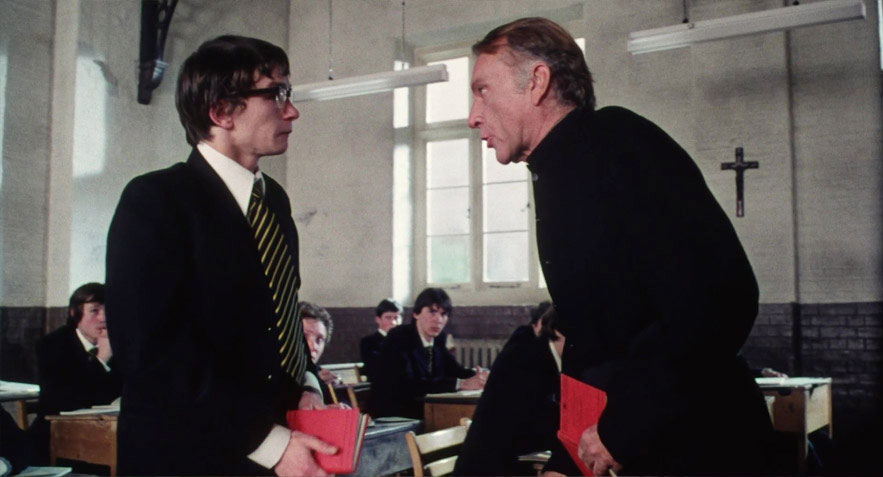
Well, the idea of a religious based education is a real problem for me, like trying to erect an otherwise fine building on foundations of quicksand. How can you teach science and truth from the entrenched context of medieval myth and fairy tale with those responsible for education agreeing upon unproven nonsense and giving it 'spiritual' weight by dint of history and ubiquity? The idea of 'Religious schools' seems to me to be the most moronic of oxymorons and it's a travesty we still have them in this or any other country. Schools should teach children not indoctrinate. They should be encouraged to think, question and doubt, not be kneaded like dough while the flour of Catholicism is pressed into them. It's no offhand remark that a friend of mine calls himself a 'recovering Catholic'. That hell fire and damnation bullshit buries itself deeply. As an aside, I saw this on Twitter the other day: "Evolution is not a debate. Reality does not magically cease to exist just because facts offend you." This effectively puts a full stop on all things divinely connected to and included in the 'good books'.
Having got that off my chest (pretty sure it won't crop up again – fingers tightly crossed behind my back) here's the story of Absolution. We follow a vagabond on a motorcycle riding around English country lanes. Blakey is a drifter who's after some menial work to pay for his itinerant lifestyle. A teacher at the school, Father Goddard, suggests he try the town further on down the road. Blakey installs himself in the school woodlands. Four days away from leaving school, Benjamin 'Benji' Stanfield is established as Father Goddard's favourite student. Alone in the priest's quarters, they read poetry and discuss spiritual matters. Benji has an unwanted friend, the cripple with a leg-brace called Arthur who dogs Benji's every move and earns the wrath of Father Goddard almost by default. Arthur is forever questioning (what I would call a good pupil) and you know what havoc questions can wreak when it comes to Catholicism. Turtles, all the way down as a defence of belief once offered... Benji gets a glimpse of a life unknown to him, one of small time thievery (subsistence thievery shall we say) and living off the land. This free spirit turns Benji's head. In the small number of days left before he can escape the school legitimately, he plans an intriguing revenge on his teacher just for, one might say, the literal hell of it.
Richard Burton was a fine actor who had to play the celebrity game more often than he plied his craft. His unmistakable voice is the cannon of his thespianic weaponry though that said, he is in complete command of his body language and is emotionally sewn up tighter than the forehead of a lined, insecure, older Tinseltown actor. The man is a walking time-bomb, a gnat's hair from detonation, held inside that black, featureless cassock like a dark wide striped straitjacket. He's a real believer so there's authentic terror in realising what may become of him if he is driven to the very edge of sanity. At the start of the film, he seems to be the most rational, in the incredible way believers can convince themselves extremely successfully that an invisible deity knows your every move and can sniff out sin like Babe on crack cocaine can find truffles. All the myths and silliness that exist in the Bible are folded in to his very being and he's passing on all this sweet poison to the next generation without a twinge of conscience. This is the way of the Lord. He has a problem, though. Benji.
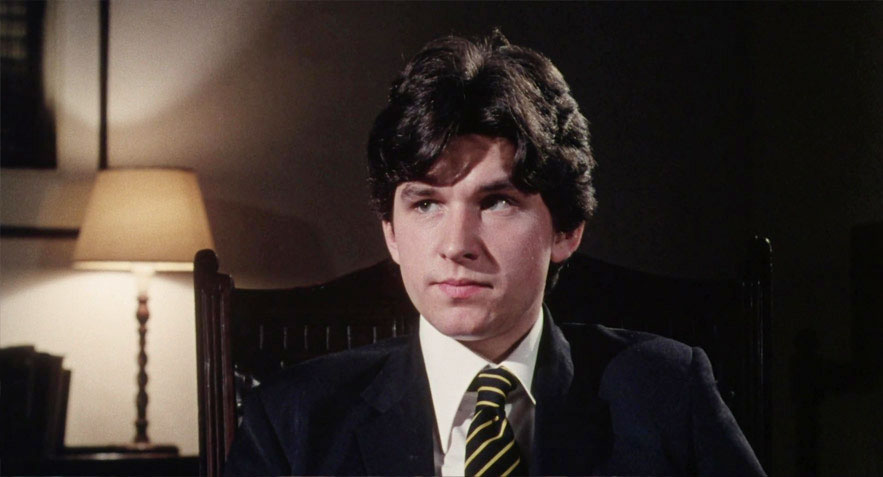
Dominic Guard has a rather TV-centric acting CV but his choices of feature film appearances are remarkable. His somewhat 'butter wouldn't melt' face has also been seen in The Go Between (his big screen debut), Picnic at Hanging Rock and Gandhi. Now there's a triple bill. He was also the voice of Pippin in Ralph Bakshi's animated Lord of the Rings. Here, he's perfectly cast as a straight A student being benevolently groomed by Father Goddard (Burton). At first, Guard has no specific event or behaviour as motivation for his dislike of Burton who is kind and paternal throughout the first half of the film. A hairy Scotsman throws a spanner in the works. Once he's been exposed to a character and a lifestyle so very different from his own, frustrations bubble to the surface. It's through his exposure to Blakey's lifestyle that he begins to doubt the standards and morality that the church and his form master are impressing upon him. It's Goddard's dismissive attitude towards Blakey, not to mention the fact he sets the police on him that starts Benji on a dangerous path. An idea is formed, the same idea Alfred Hitchcock toyed with in his I Confess. As all good Catholics know, a confession is sacrosanct and priests who allow anyone but the confessor to know of what was said can be ex-communicated. I would love to have been a fly on the wall in the cold, draughty church in the 16th century when someone suggested a private box would be necessary to keep priests and woman apart. All these rules, heaven sent. It wasn't the women that needed to be kept apart from the priests...
'Chekov's gun' is a narrative concept originated by the great Russian playwright. He maintained that every aspect of a story should impact in some way on the whole – no wasted ideas. If you see a gun in an early scene, said gun better go off in a later one. Foreshadowing is both a writer's curse and blessing. Do it well enough and the audience react with surprise and delight at how well they've been truly led down the garden path (I would put The Sixth Sense in this category) but if you screw it up... Sometimes it's heavy handed (a little "Aha!" went up in my mind the first time I heard Hooper on the Orca in Jaws remind Brody that "You screw around with these tanks and they're going to blow up!"). But director Anthony Page and writer Anthony Shaffer (with a little dialogue help from co-writer Richard O'Keefe who worked on the students' dialogue and John Bowen, rewriting Goddard's dialogue) manage to signpost superbly well. The film rewards second and third viewings as most good movies do. You recognise the signposts and smile at how much the filmmakers slipped past you while you were being entertained elsewhere.
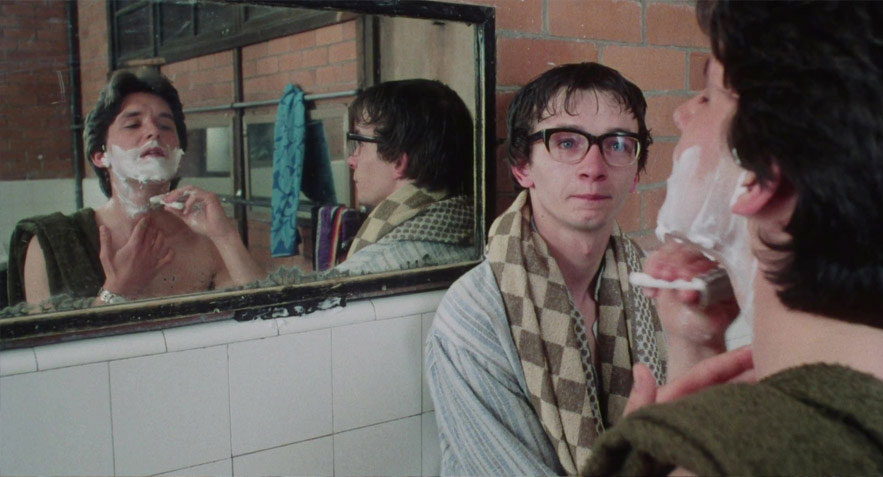
There are a few more notable aspects of the film worth airing. With his right leg in a brace, cripple Arthur is played by none other than David (Dai) Bradley. Now this name may not ring a bell but if I say as a 14 year-old he was plucked out of his northern town with no acting experience to essentially star in Ken Loach's Kes, you'll know whom I mean. Let's just say that Kes was no fluke. Here is an actor of great range and emotional subtlety. His pathetic Arthur is a character that all of us have known in schools worldwide, the outsider with a disability and an enquiring mind that who cannot get the time of day from anyone. Blakey is played by folk singer and stand-up comedian Billy Connolly, his big screen debut. It's another perfect piece of casting, so much so that you begin to think that Connolly actually lived like that. His short but effortlessly natural scenes with Sharon Duce lying on his lap are a joy. Duce appeared in a significant role in my teenage years (the name and the face occupy the platonic playroom of my brain) but even scanning an IMDb credit list, I cannot place the role that so enchanted me. She and Dominic Guard met on Absolution and went on to have two children together. Hilary Mason as Miss Froggat (the only female teacher at the school) is well known to thriller fans as the cloudy eyed psychic in Nic Roeg's masterpiece Don't Look Now, while Kes' old school master and cold weather football torturer Brian ('Man United') Glover turns up in a brief scene to suggest with his fists that Connolly move on. There's also the lugubrious features of John Nettleton forever immortalised as Cabinet Secretary, Sir Arnold Robinson in Yes, Minister and Yes, Prime Minister, one the BBC's finest sit-coms. Stanley Myers the composer has outdone himself here with a masterful score that starts very unassumingly, giving Connolly's own composed banjo music dominance. But we lose the charm of the banjo to a full-throated orchestral score that really amps the tension, the horror and the psychological angst.
Absolution is a slow burn thriller with a pacey narrative (yes, I'm aware how contradictory that sounds but I am, ahem, unrepentant) which belts along with many twists and turns. Half the fun is keeping up with characters' motivations and working out who's playing whom. The twists are genuinely effective and it boasts an ending that you simply could not see coming but is oh, so satisfying.
From the full frame trailer featured on the disc, we can assume Absolution's 1.85:1 aspect ratio is an intended crop from the full frame 4:3 35mm frame. The film looks great with very little damage, good blacks (in a film with a lot of black-robed religious types, this is fairly important) and a pleasing naturalistic look throughout. Grain is present but negligible. On the whole, a very solid and muted visual palette with Billy Connolly the only colourful character in more ways than one.
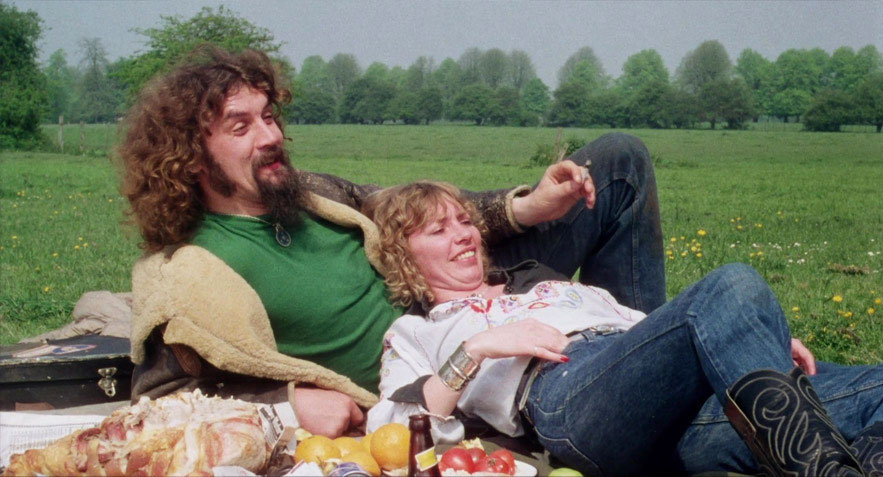
The original mono audio presentation is well-defined, noiseless with no signs of age and every word is crystal clear (with the exception of the deliberately muffled expletives from Billy Connolly as he argues with Guard).
There are new and improved English subtitles for the deaf and hard-of-hearing.
Audio commentary with film historian Kevin Lyons, editor of The Encyclopedia of Fantastic Film and Television
Lyons has certainly done his homework. There is a neatness and control to this commentary that suggests that it has been meticulously researched and carefully worked out long before being recorded. Nothing wrong with this at all though it would have been nice for Lyons to go off road a few times for us to understand his own emotional connection to the film. He saves that up for his closing remarks, a clarion call to get the film more widely appreciated – and that's always appreciated. Hope we're adding to that goal.
This is all great background stuff and detail that enhances the film and repeated viewings no end. He provides character motivations as well as fact after pertinent fact. He notes that the film was given an 'X' certificate for its first screening and a subsequent '15' for VHS release. There's no mention of why the certificate was reduced. Nice to hear that Lyons quotes the quote I chose for the start of the review. He reminds us that Shaffer was critical of the director Anthony Page. One wonders if this was because his dialogue was rewritten before and during shooting. It's best noted here that the commentary is partnered with the Theatrical Cut so you get more minutes of commentary. A fine job, Mr. Lyons and a joy to listen to.
The Devil to Pay: Interview with director Anthony Page (2018): a new interview with the great theatre, film and television director (12' 09")
"The screenplay wasn't at all good..." OK, great start! There are snippets of unexpected behind the scenes information here and info on Shaffer and his behaviour. Imagine someone writes his autobiography that includes lies about a project you've been intimately involved with. Galling to say the least. I worked on a film not that long ago which won an award and someone involved with the project in a minor capacity took credit for my work. I was startled how profound my anger was. God knows what that's like with so much retrospect and no righting of the wrongs possible because (a) the slanderer is dead and (b) the cost of a lawsuit prohibitive. This is a gentle recollection and playing Devil's advocate a little, it's nice to hear about the behind the scenes not being a love-in for once: professional, yes but this is probably what most films are like behind the scenes.
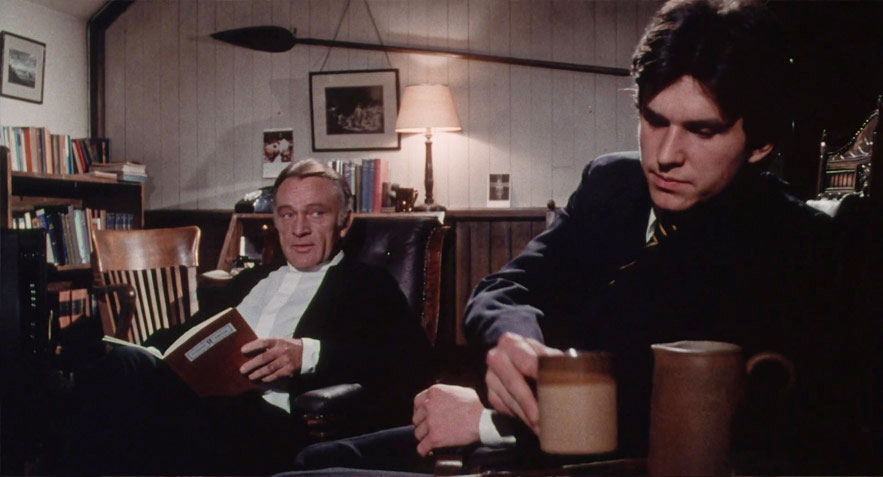
Them and Us: Interview with actor Dominic Guard (2018): a new interview with the young star of the film (13' 06")
Recognisable instantly from a certain look and that voice, Guard looks terrific forty years on. His remark "It was just like school, there are some people you get on with more than others," is to me wisdom however casually delivered. School is supposed to prepare you for life 'outside' and in one sense it just shows up the human being for the imperfect primate it is. He mentions in passing about the relationship between teacher and star pupil now forever mired in the sex scandals at the very heart of the church. Can you imagine not having fun shooting with Connolly? Guard mentions some improvisation with the Connolly character (with a Shaffer script? Brave... Apparently not – see the writing credits in the booklet). Guard describes the harrowing process actors have to endure if a life cast is required for certain scenes. He adds that he, like most actors, is not keen watching himself on screen. The ex-actor is now a child psychotherapist in London, which very satisfactorily answers the question always in the back of mind seeing famous actors who have been years off screen. I hope his child patients never see one scene of this film in particular. What nightmares may come, to paraphrase Hamlet.
Cutting The Cloth: Interview with Costume Designer Anne Gainsford (2018) (9' 05")
A set of memories recalled from the costume designer is a very welcome extra as it reminds people just what a small (and today a ridiculously large) army it takes to shoot a movie. Gainsford's recollections are interesting and pertinent. Connolly had been hired and asked to start filming straight away giving Gainsford no time to do a fitting. Connolly's prop motorcycle broke down on day one so at last she had a chance to dress the actor properly and not just depend on Connolly's wife to do her job for her.
Original theatrical trailer (3' 05")
So we sail into truly mysterious waters... This trailer (for those who know the film) tells the whole story in compacted form. In fact excerpts from all the major scenes are present. It's HD with some damage on the original film materials and oddly presented in the 4:3 aspect ratio. From further examination, it seems like an open matte version of the trailer hence the 4:3 aspect ratio. The 'real' trailer and movie were then masked off to present a 1.85:1 viewing experience. But I would bet a little (not a lot) that this is a new trailer post produced in the digital age. While it may be a carbon copy of the original trailer I cannot say but those titles have been added digitally not optically (they don't 'shudder' as optical titles were wont to do).
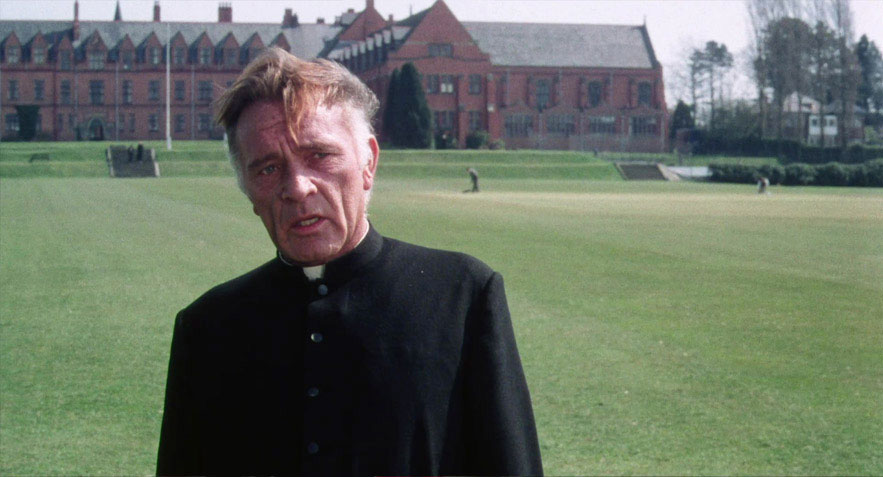
On You Tube there is another trailer, much dirtier with era specific textual overlays that is a minute long but two things make me think it may not be valid or official. There's no voice over or text at the end to point to it being a trailer at all and Connolly says "Fuck off!" twice, a phrase that would not have got past the BBFC in a trailer despite the 'X' certificate the film went on to justify. So, does the 'give everything away' trailer work? Yes, if you've not seen the film. But I would advise people to see the film before indulging in any of these special features, including the next set however innocuous they may seem.
Stills and Poster Gallery
In order, what we have here is: 8 x black and white stills, 20 x colour with 2 showing two shots on one screen (please do keep away from this lot before you see the movie). 27 x black and white shots including one doubled up. Then we get the poster designs x 2, the novelisation cover and VHS cover. There are newspaper ads, 4 more posters in black and white and lastly a painted colour poster which feels too modern to be 1978 specific.
Press Materials Gallery
In the late 70s to the mid 80s I worked in a cinema and earned the right to attend press screenings, about two a week at which were made available press materials. Having no journal to write for, I was always last in the queue if there wasn't enough to go around. But if I were lucky, I'd leave in the early hours with a synopsis and a black and white still or two. Result! The forty items on offer here are details of almost all the press materials available. Brochures, synopses and posters are all broken down in close up and everything you want to know about all the principals and the movie itself, it's all here.
Limited edition exclusive booklet with a new essay by Neil Sinyard, an overview of contemporary critical responses, historic articles, and film credits
The sample booklet we have for review as a PDF features a cover that is such a major spoiler I'm hoping to Christ (seems appropriate) that it's just a placeholder... Full of the Devil is Indicator stalwart Neil Sinyard's piece on the film, full of detail and insight. Blasphemy perhaps but he signs off with a preference for Shaffer's Absolution over his The Wicker Man... Let the pagan swords slash the air. Summer is a-coming in...
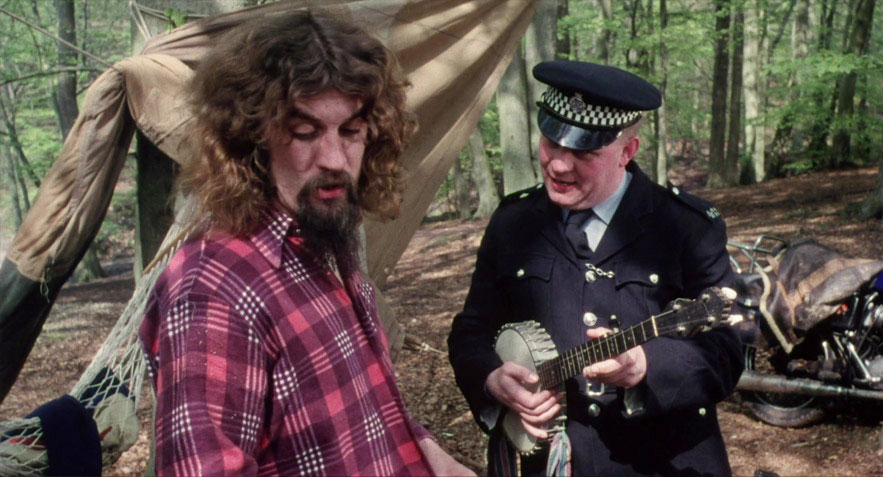
Anthony Page: On Location 1979 is a collection of segments from press clippings detailing the director's search for the perfect country lanes. Glad to see Connolly's quote turning up again in the notes on this piece. Anthony Shaffer on Absolution sheds light on Shaffer's versions of events, questioned by both Connolly and director Page. He mentions something all too common in filmmaking – screening the film for whoever's on hand to see it (in this case the studio cleaners) and then if they react the way that supports the writer's view, it's held up as "You see! My idea was right!" In our hypersensitive, social media marshland that we all navigate, isn't it extraordinary that a lone dissenting voice can carry such weight? Recently a woman put up a poster with the dictionary definition of 'woman' in Liverpool to encourage debate during the Labour Party conference. Let me be clear; the dictionary definition of 'woman'. A teacher (a, as in singular person) complained that it may hurt transgender persons and the poster was promptly removed. I am open to argument why this may have been the correct course of action but the first response of my rational side just weeps. I thought we got to peak-sensitivity over the 'lingerie in a lift' debacle but no. One person without debate now holds power ad absurdum and companies are so scared, capitulation before one dissenter is now the default. Wow. Would they have committed ritual suicide if two people had complained? "Good job I didn't tell him about the dirty fork..."
Absolution The Boys covers the characters and real lives of the younger stars. It seems that Dominic Guard was predisposed at an early age to help children in distress. This piece, featuring quotes from Guard and Dai Bradley claims to be sourced from press materials from 1978. It is obviously written in hindsight incorporating the press materials at the time. Wikipedia mentioned that Guard stopped acting in 2000, presumably then training to become a child psychologist, a fact mentioned in the text. It's useful information and it's amusing that Bradley followed Harrison Ford's career path in reverse... actor then carpenter.
Natasha Kroll features two pages of information on the talented production designer. Absolution The Alternative Ending reveals that Shaffer rewrote a slightly different ending in his novelisation as well as a coda. We're not talking anything major (it's not like Goddard's a replicant or anything) but let's just say that the bad guy lets the other bad guy off the hook and leave it at that. Both changes are interesting in context but don't deflect from the movie's ending in any way. Critical Response gives us four clips from reviews at the time with, of all publications, Playboy's being the most supportive.
A first class psychological thriller with some real surprises sees a cocky, self-serving boy take on a teacher in a battle of wits and souls all played out against the backdrop of a Catholic boys' school in the late 70s. With wonderful performances from the principals, a strong script, a sure directorial hand and an unnerving score, Absolution is a must for thriller aficionados.
|